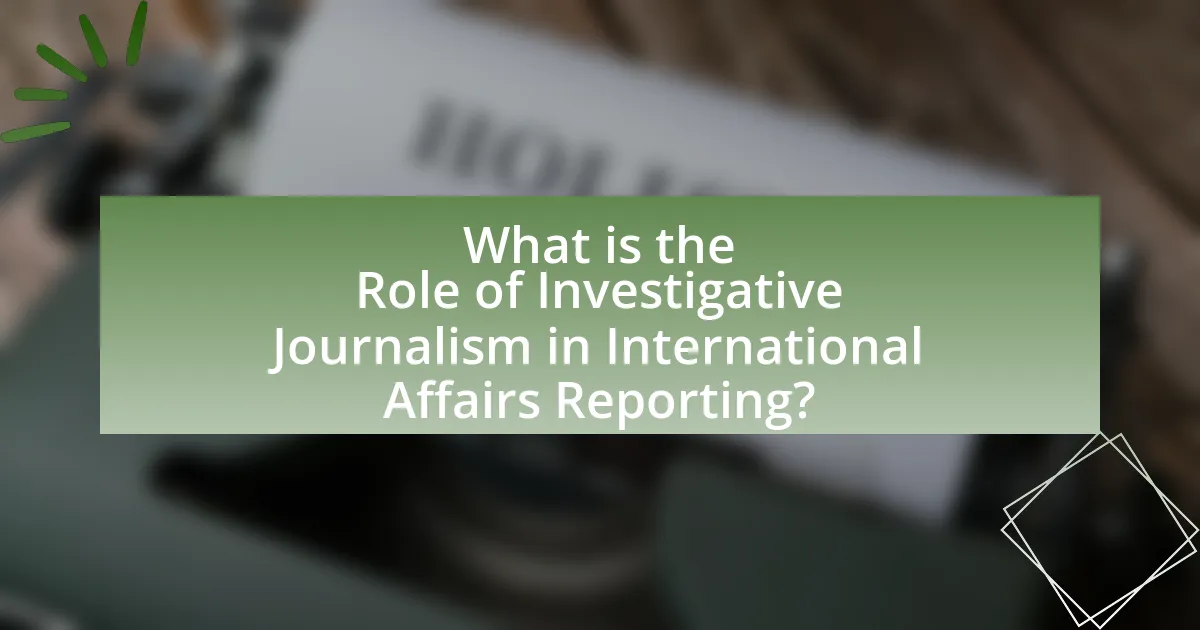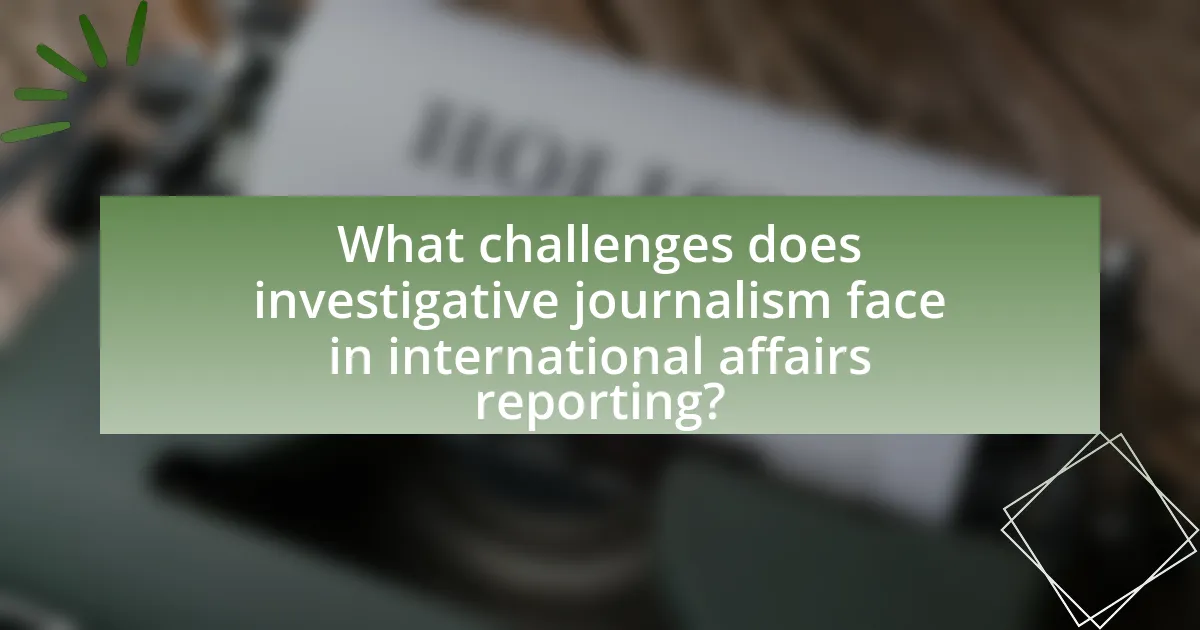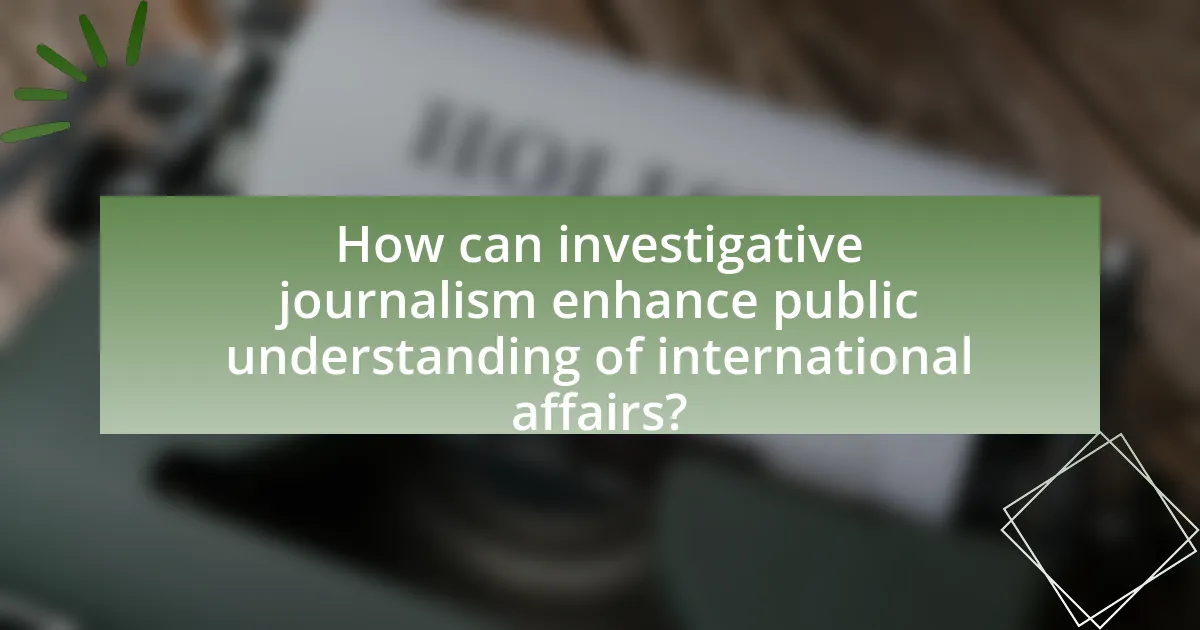Investigative journalism is a vital component of international affairs reporting, serving to uncover hidden truths, expose corruption, and hold powerful entities accountable. This article explores the distinct characteristics of investigative journalism compared to traditional reporting, emphasizing its role in promoting transparency and informing public discourse on critical global issues. Key examples, such as the Panama Papers and the Watergate scandal, illustrate the impact of investigative work on policy changes and public opinion. Additionally, the article addresses the challenges faced by investigative journalists, including political pressures and safety concerns, while outlining best practices for effective reporting in international contexts.

What is the Role of Investigative Journalism in International Affairs Reporting?
Investigative journalism plays a crucial role in international affairs reporting by uncovering hidden truths, exposing corruption, and holding power to account. This form of journalism often involves in-depth research, interviews, and analysis to reveal information that may not be readily accessible to the public. For instance, the Panama Papers investigation in 2016 exposed the offshore financial dealings of numerous global leaders and public figures, highlighting the impact of financial secrecy on international governance. Such investigations not only inform the public but also influence policy changes and promote transparency in international relations.
How does investigative journalism differ from traditional journalism in international affairs?
Investigative journalism in international affairs focuses on uncovering hidden truths, often involving in-depth research and analysis, while traditional journalism primarily reports on events and facts as they occur. Investigative journalists typically engage in extensive fact-checking, source verification, and may work for extended periods to expose corruption, human rights abuses, or governmental malfeasance, as seen in cases like the Panama Papers, which revealed global tax evasion schemes. In contrast, traditional journalism tends to prioritize timely reporting and surface-level coverage of international events, relying on official statements and press releases rather than deep investigative work. This distinction highlights the critical role investigative journalism plays in holding power accountable and providing comprehensive insights into complex international issues.
What are the key characteristics of investigative journalism?
Investigative journalism is characterized by in-depth research, critical analysis, and the pursuit of truth regarding complex issues. This form of journalism often involves uncovering hidden information, exposing corruption, and holding powerful entities accountable. Key characteristics include thorough fact-checking, reliance on credible sources, and the use of various investigative techniques such as interviews, public records analysis, and data mining. For instance, the Watergate scandal investigation by journalists Bob Woodward and Carl Bernstein exemplifies these characteristics, as it involved extensive research and the revelation of significant political misconduct.
Why is investigative journalism crucial for understanding international issues?
Investigative journalism is crucial for understanding international issues because it uncovers hidden truths and provides in-depth analysis of complex global events. This form of journalism often reveals corruption, human rights abuses, and the impact of government policies, which are essential for informed public discourse. For instance, the Panama Papers investigation exposed widespread tax evasion and financial misconduct involving numerous global leaders and corporations, highlighting the interconnectedness of international finance and governance. Such revelations enable citizens and policymakers to grasp the implications of international issues, fostering accountability and transparency on a global scale.
What are the primary objectives of investigative journalism in international affairs?
The primary objectives of investigative journalism in international affairs are to uncover hidden truths, hold power accountable, and inform the public about critical issues. Investigative journalism seeks to expose corruption, human rights violations, and abuses of power by conducting thorough research and analysis. For instance, the work of journalists in exposing the Watergate scandal demonstrated the importance of investigative reporting in revealing governmental misconduct, leading to significant political consequences. This type of journalism plays a crucial role in promoting transparency and fostering informed citizenry, which is essential for a functioning democracy.
How does investigative journalism contribute to transparency and accountability?
Investigative journalism enhances transparency and accountability by uncovering hidden truths and exposing corruption or malpractice within institutions. This form of journalism rigorously investigates issues that may be overlooked or intentionally concealed, providing the public with critical information necessary for informed decision-making. For instance, the Watergate scandal, investigated by journalists Bob Woodward and Carl Bernstein, led to the resignation of President Nixon, demonstrating how investigative reporting can hold powerful figures accountable. Furthermore, studies show that investigative journalism can lead to policy changes and reforms, as seen in cases where media exposure prompted legislative action against corporate malfeasance.
What role does investigative journalism play in uncovering corruption and human rights abuses?
Investigative journalism plays a crucial role in uncovering corruption and human rights abuses by exposing hidden truths and holding powerful entities accountable. This form of journalism employs in-depth research, interviews, and analysis to reveal misconduct that may otherwise remain concealed. For instance, the reporting by The Washington Post on the Watergate scandal in the 1970s led to significant political repercussions, including the resignation of President Richard Nixon, highlighting how investigative journalism can directly impact governance and public trust. Furthermore, organizations like ProPublica and the International Consortium of Investigative Journalists have uncovered systemic corruption and human rights violations globally, demonstrating the effectiveness of investigative journalism in promoting transparency and justice.

What challenges does investigative journalism face in international affairs reporting?
Investigative journalism in international affairs reporting faces significant challenges, including limited access to information, political pressure, and safety concerns for journalists. Limited access to information arises from government secrecy and restrictions on press freedom, which hinder journalists’ ability to gather facts and conduct thorough investigations. Political pressure often manifests through threats, censorship, or legal repercussions aimed at discouraging critical reporting on sensitive issues. Additionally, safety concerns are heightened in conflict zones or authoritarian regimes, where journalists may face violence, imprisonment, or even assassination, as evidenced by the deaths of numerous journalists in war-torn regions. These challenges collectively impede the effectiveness and integrity of investigative journalism in the realm of international affairs.
How do political and legal pressures impact investigative journalism?
Political and legal pressures significantly hinder investigative journalism by creating an environment of fear and self-censorship among journalists. These pressures can manifest through government regulations, threats of legal action, or even direct intimidation, which discourage reporters from pursuing sensitive stories. For instance, in countries with strict press laws, journalists may face lawsuits or criminal charges for exposing corruption or misconduct, leading to a chilling effect on their willingness to investigate. According to the Committee to Protect Journalists, in 2021, over 300 journalists were imprisoned worldwide, often under politically motivated charges, illustrating the severe consequences of such pressures on the freedom to report.
What are the risks faced by investigative journalists in hostile environments?
Investigative journalists in hostile environments face significant risks, including physical violence, imprisonment, and harassment. These risks stem from the opposition they encounter from governments, criminal organizations, and other powerful entities that seek to suppress dissent and control information. For instance, according to the Committee to Protect Journalists, over 1,300 journalists have been killed since 1992, with many targeted for their investigative work in dangerous regions. Additionally, the threat of legal repercussions, such as defamation lawsuits or anti-terrorism laws, further endangers their ability to report freely. These factors create a perilous landscape for journalists committed to uncovering the truth in challenging contexts.
How do censorship and media restrictions affect the quality of reporting?
Censorship and media restrictions significantly diminish the quality of reporting by limiting access to information and stifling diverse viewpoints. When journalists face constraints on what they can investigate or publish, the resulting reports often lack depth, accuracy, and critical analysis. For instance, a study by the Committee to Protect Journalists found that in countries with high levels of censorship, such as North Korea and China, the media often disseminates government propaganda rather than factual reporting, leading to a misinformed public. This suppression of information not only affects the credibility of the media but also undermines democratic processes by preventing accountability and transparency in governance.
What ethical considerations are involved in investigative journalism?
Investigative journalism involves several ethical considerations, primarily centered around truthfulness, integrity, and the potential impact on individuals and society. Journalists must ensure accuracy in their reporting to maintain credibility and avoid misinformation, as seen in the case of the Watergate scandal, where accurate investigative reporting led to significant political consequences. Additionally, the principle of minimizing harm requires journalists to consider the potential repercussions of their findings on the subjects involved, balancing public interest with individual privacy rights. Furthermore, transparency in sourcing and methods is crucial to uphold ethical standards, as demonstrated by the Society of Professional Journalists’ Code of Ethics, which emphasizes the importance of accountability and ethical behavior in journalism.
How do journalists balance the public’s right to know with individual privacy rights?
Journalists balance the public’s right to know with individual privacy rights by adhering to ethical guidelines and legal standards that prioritize transparency while respecting personal boundaries. They often assess the public interest in the information against the potential harm to individuals’ privacy, considering factors such as the relevance of the information to public discourse and the individual’s role in society. For instance, the Society of Professional Journalists emphasizes the importance of minimizing harm, which guides journalists in making decisions about what to publish. Additionally, legal frameworks, such as privacy laws and court rulings, provide boundaries that journalists must navigate, ensuring that their reporting does not infringe on individuals’ rights unnecessarily.
What guidelines should journalists follow to maintain integrity in their reporting?
Journalists should adhere to guidelines such as accuracy, fairness, transparency, and accountability to maintain integrity in their reporting. Accuracy requires verifying facts before publication, as evidenced by the Society of Professional Journalists’ Code of Ethics, which emphasizes the importance of truthfulness. Fairness involves presenting multiple viewpoints, ensuring that all sides of a story are represented, which fosters trust among audiences. Transparency is crucial; journalists should disclose their sources and methods when possible, allowing readers to understand the context of the information presented. Accountability means that journalists must take responsibility for their work, correcting errors promptly and openly, which reinforces credibility. These guidelines collectively support the ethical standards necessary for responsible journalism, particularly in the sensitive realm of international affairs reporting.

How can investigative journalism enhance public understanding of international affairs?
Investigative journalism enhances public understanding of international affairs by uncovering hidden truths and providing in-depth analysis of complex issues. This form of journalism often involves extensive research, interviews, and data analysis, which reveal the underlying factors influencing global events. For instance, the Panama Papers investigation exposed widespread tax evasion and corruption involving powerful figures worldwide, significantly informing the public about the implications of financial secrecy on global economies. By presenting detailed narratives and factual evidence, investigative journalism fosters critical thinking and encourages informed public discourse on international matters.
What techniques do investigative journalists use to gather information?
Investigative journalists use techniques such as interviews, public records requests, data analysis, and undercover reporting to gather information. Interviews allow journalists to obtain firsthand accounts and insights from sources directly involved in the story. Public records requests enable access to government documents, which can reveal critical information about policies and actions. Data analysis involves examining large datasets to uncover patterns or discrepancies, often leading to significant findings. Undercover reporting allows journalists to observe and document situations that may be hidden from public view, providing evidence that supports their investigations. These techniques are essential for uncovering truths in complex international affairs.
How do sources and whistleblowers contribute to investigative reporting?
Sources and whistleblowers are essential to investigative reporting as they provide critical information that can expose wrongdoing and hold powerful entities accountable. Whistleblowers, often insiders with firsthand knowledge, reveal misconduct that may otherwise remain hidden, such as corporate fraud or government corruption. For instance, the whistleblower Edward Snowden disclosed classified information about mass surveillance programs, leading to significant public debate and policy changes regarding privacy and security. Sources, including experts and witnesses, further enrich investigative stories by offering context, corroborating evidence, and additional perspectives that enhance the credibility and depth of the reporting. Together, these contributors enable journalists to uncover truths that are vital for informed public discourse and democratic accountability.
What role does data analysis play in investigative journalism?
Data analysis plays a crucial role in investigative journalism by enabling journalists to uncover patterns, trends, and insights from large datasets that may reveal corruption, fraud, or other societal issues. By employing statistical methods and data visualization techniques, investigative journalists can substantiate their claims with empirical evidence, enhancing the credibility of their reports. For instance, the International Consortium of Investigative Journalists utilized data analysis in the Panama Papers investigation, analyzing millions of documents to expose offshore tax evasion by prominent figures worldwide. This demonstrates how data analysis not only supports investigative findings but also amplifies the impact of journalism in holding power accountable.
What impact does investigative journalism have on policy and public opinion?
Investigative journalism significantly influences policy and public opinion by uncovering truths that hold power to account. This form of journalism often reveals corruption, malpractice, and social injustices, prompting public discourse and legislative action. For instance, the Watergate scandal, investigated by journalists Bob Woodward and Carl Bernstein, led to President Nixon’s resignation and significant reforms in campaign finance laws. Such investigations not only inform the public but also pressure policymakers to enact changes, demonstrating the critical role investigative journalism plays in shaping democratic governance and societal norms.
How can investigative reports influence government actions and reforms?
Investigative reports can significantly influence government actions and reforms by exposing corruption, malpractice, and systemic issues within public institutions. These reports often provide detailed evidence that prompts public outcry and demands for accountability, leading to legislative changes or policy reforms. For instance, the Watergate scandal, uncovered by investigative journalists, resulted in major political reforms in the United States, including the establishment of stricter campaign finance laws and increased transparency measures. Such reports serve as a catalyst for change by informing the public and policymakers about critical issues that require immediate attention and action.
What examples demonstrate the effectiveness of investigative journalism in shaping public discourse?
Investigative journalism effectively shapes public discourse through notable examples such as the Watergate scandal and the Panama Papers. The Watergate investigation by journalists Bob Woodward and Carl Bernstein led to the resignation of President Richard Nixon, significantly altering public trust in government and prompting reforms in campaign finance and transparency. Similarly, the Panama Papers, released in 2016, exposed global tax evasion involving numerous politicians and public figures, igniting worldwide discussions on corruption and tax justice, which resulted in policy changes in several countries. These instances illustrate how investigative journalism can influence public opinion and drive legislative action.
What best practices should aspiring investigative journalists follow?
Aspiring investigative journalists should prioritize thorough research, ethical integrity, and strong storytelling skills. Thorough research involves verifying facts, utilizing multiple sources, and cross-referencing information to ensure accuracy. Ethical integrity is crucial; journalists must adhere to ethical guidelines, such as respecting privacy and avoiding conflicts of interest, as outlined by organizations like the Society of Professional Journalists. Strong storytelling skills enable journalists to present complex issues in an engaging manner, making the information accessible to the public. These practices are essential for maintaining credibility and fostering trust in investigative journalism, which plays a vital role in holding power accountable in international affairs.
How can journalists effectively build and maintain sources in international contexts?
Journalists can effectively build and maintain sources in international contexts by establishing trust through consistent communication and demonstrating reliability. Building rapport with sources involves understanding cultural nuances and showing respect for local customs, which fosters a sense of safety and openness. For instance, journalists who engage in active listening and provide feedback create a collaborative environment that encourages sources to share sensitive information.
Maintaining these relationships requires ongoing engagement, such as regular check-ins and updates, which reinforces the journalist’s commitment to the source. Additionally, journalists should prioritize confidentiality and ethical considerations, as seen in the case of the Panama Papers, where trust was crucial for whistleblowers to come forward. By adhering to these practices, journalists can cultivate a network of reliable sources that enhances their investigative reporting in international affairs.
What resources are available for journalists looking to improve their investigative skills?
Journalists looking to improve their investigative skills can access various resources, including training programs, online courses, and professional organizations. Notable training programs include the Investigative Reporters and Editors (IRE) workshops, which provide hands-on experience and expert guidance. Online platforms like Coursera and edX offer courses on investigative journalism, often created by reputable universities. Additionally, organizations such as the Center for Investigative Reporting and the International Consortium of Investigative Journalists (ICIJ) provide valuable tools, resources, and networking opportunities for journalists seeking to enhance their skills. These resources are widely recognized in the field and have been utilized by many successful investigative journalists.




